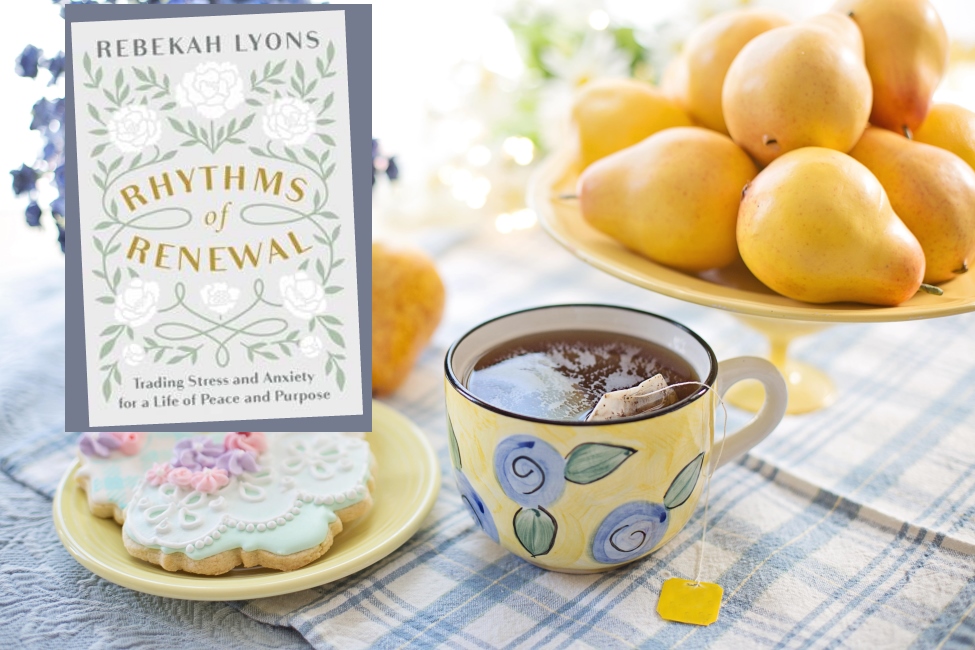
Rhythms of Renewal–A Book Review
Rhythms of Renewal, by Rebekah Lyons, is a book aimed specifically at anxiety. Rebekah Lyons is an author and speaker whose life ministry largely focuses on conquering fear and anxiety through biblical teaching. As such, the entirety of this book is helpful to the anxious soul.
I want to say this book resonated. I last reviewed Ann Voskamp’s Waymaker, which hit somewhere down in the depths of my soul. Lyons did not do that. We never really connected emotionally. However, as far as practical, down-to-earth plans for living through and beyond anxiety, this book rocks. First, the book is divided into four rhythms, each with eight short, easy, practical chapters. When taken more or less in order, these four rhythms can help calm and heal an anxious soul. Each chapter ends with reflection questions, which are great for pondering or journaling. I zipped past most of them the first time and then lingered with them on second readings.
Rest
The first rhythm is Rest. Here she tackles the practical aspects of rest, like sleep and Sabbath rest, as well as morning routines, heart examination, tech detox, and being quiet. If you have studied anxiety at length, nothing in this section is new, but she says it well and lays it out in an easy-to-access manner. Her style is comfortable and practical. Starting with rest is sensible, as those with long-term anxiety are, if anything, weary. And weariness is not a position from which many of us can heal. That has to heal first before anything else can be fixed.
My favorite chapter in this section dealt with morning routines, maybe because this is something I’ve already been pondering. My catch-word this year seems to be rhythm, and a morning routine is a daily rhythm I struggle with. I personally deal with a lot of morning anxiety, waking up with physical anxiety symptoms before I’ve even had a coherent thought. Her main focus is making time with God part of a morning routine, and she shares ways to go about this.
Restore
The second rhythm is Restore. I expected this to be more heart and soul restoration, but again she starts with practical care. Play, diet, exercise, along with a few like avoiding labels, having adventures, and stepping out of the comfort zone. (Check out this post if you want my personal thoughts on comfort zones.). She touches on whole body and soul healing here, with physical restoration as well as mental and spiritual restoration. However, some of this isn’t easy to put into practice if you are in the depths of anxiety. Adventures and trying new things—maybe those can wait until some of the other rhythms start to heal the anxious soul.
The chapter in this rhythm that was the newest and resonated with me the most had to do with labels. As the mother of a son with Down Syndrome, Lyons has a unique perspective on labels and identity, and she rightly suggests that how we see ourselves can differ from how God sees us, usually to our detriment. I know I struggle with this. I’ve always been anxious and backward, and I let those things become my defining points.
The problem is… we shift from believing a label is something we face to believing it’s something we are.
Rebekah Lyons, Rhythms of Renewal
This was the chapter where I felt the most emotional connection with Rebekah, as a mother and fellow anxious person. She beautifully wove her own story in with solid Biblical truths about how God sees his children. This is a section I’ve revisited, and likely I will need to revisit it again.
Connect
The third rhythm is Connect. Because I struggle with a whole lot of social anxiety, this section hurt. This is where I realized Rebekah is coming at this from a completely different place than I am. I don’t know this woman, of course, but I suspect she is an extravert with anxiety, someone with very different fears than me and a very different personality. And while this is fine—I can learn a lot from someone unlike me—she never quite explains how a person with social anxiety can put this rhythm into practice.
In the Connect rhythm, she deals with topics like friendship, hospitality, physical touch, marriage, and burden bearing. The hardest was her open porch policy, having a place where someone can simply show up and be loved. Oh, how I long to be that person, to open my heart and life to friends and connections and intimacy. The idea of friends showing up at my door, of me holding them close and crying with them and laughing with them… It’s a dream, a beautiful dream. But telling me it’s a great thing doesn’t help me get there.
However, for someone who can get there, I agree that connections are vital for healing the anxious soul. I just need a better blueprint. Even if you can’t do everything on her list, I advise you to look at this section and find something, some little ways to reconnect, as anxiety is isolating, and isolation can exacerbate anxiety. Do what you can to break the cycle.
Create
The final rhythm was the newest to me, and it filled me with a lot of hope. This is the Create rhythm. Here Rebekah calls us to dream, to find passions, to create with our hands, to learn and play. I had never heard anyone suggest this kind of activity can heal the anxious soul. I agree with her one hundred percent that the mind that creates and strives and loves and feels is going to be healthier and have less space for anxious thoughts, and I loved that she felt so strongly that hobbies and what the world might consider time wasters are important and healthy and healing.

I’m not sure I have a favorite for this section. Instinctively I’d already put a lot of this into my life. The most surprising chapter was about responsibility. She suggests having responsibility, being needed and useful, can help with anxiety. She also points out the balance—some of us feed anxiety with too many responsibilities. Her example was giving her child chickens to care for when that child struggled with anxiety, since children often have too few responsibilities and can feel like they have no control or are unnecessary in their lives. Then she says that everyone can consider new areas of responsibility, something to get you out of bed and out the door.
If you are overly busy and don’t take time to create or to play or to try new things, I suggest you read this section carefully and add a few. When I am working toward creating or putting my passions into play, I struggle with less anxiety. Maybe you will, too. (Here’s a list of some hobbies to consider as an anxious soul.)
The Whole Book
Rhythms of Renewal opens with a call to take inventory. She uses a few specific questions to help you determine if your life is focused and arranged the way you want it to be. Anxiety is often uncertainty about the future or about behavior, and understanding where you are and what you are doing—and why—can be the first step to applying the rest of the book. As she says, it is never too late to re-establish what you want your life to be about. I think this is a great place to start. She takes both daily and quarterly inventory.
It is never too late to establish what you want your life to be about
Rebekah Lyons, Rhythms of Renewal
I love the balance in the book. As someone who strongly agrees that rhythms in life are vital to mental health, she was preaching to the choir here. Also, she is practical and easily accessible. I mentioned the last book I reviewed, Waymaker by Ann Voskamp, has a very poetic, flowery prose that will not appeal or even make sense to some readers. Rebekah Lyons is accessible to anyone.
But at the same time, she didn’t deal with some of the varieties of anxiety issues. To get the most from this book, I suggest you know your fears, and work from what’s accessible before considering the scariest things. I doubt I will have an open porch policy anytime soon, but I can work on a better night’s sleep, better diet, and putting my passionate, creative side to use. I can leave some of it for now, no guilt, because I’m a work in progress. Likely any reader will find some of these tips and ideas just right, and others miss the mark.




